Report on Organisational Behaviour: Analysis of 4com plc
VerifiedAdded on 2020/10/05
|18
|5755
|338
Report
AI Summary
This report provides an in-depth analysis of organisational behaviour within 4com plc, a UK-based telecommunications company. It explores the impact of organisational culture, power, and politics on individual and team performance. The report examines various power dynamics including coercive, reward, legitimate, referent, expert, and informational power, and also explores Handy's typology of organisational culture, Chanlat's characteristics of political behaviour, and Hofstede's Cultural Theory. Furthermore, the report evaluates content and process theories of motivation, including McClelland's need theory (affiliation, achievement, and power), Maslow's hierarchy of needs, and Herzberg's two-factor theory, to assess their influence on employee behaviour. The report also discusses the characteristics of effective and ineffective teams and applies organisational behaviour concepts to the 4com plc context. The conclusion summarizes the key findings and provides insights into improving organisational performance.
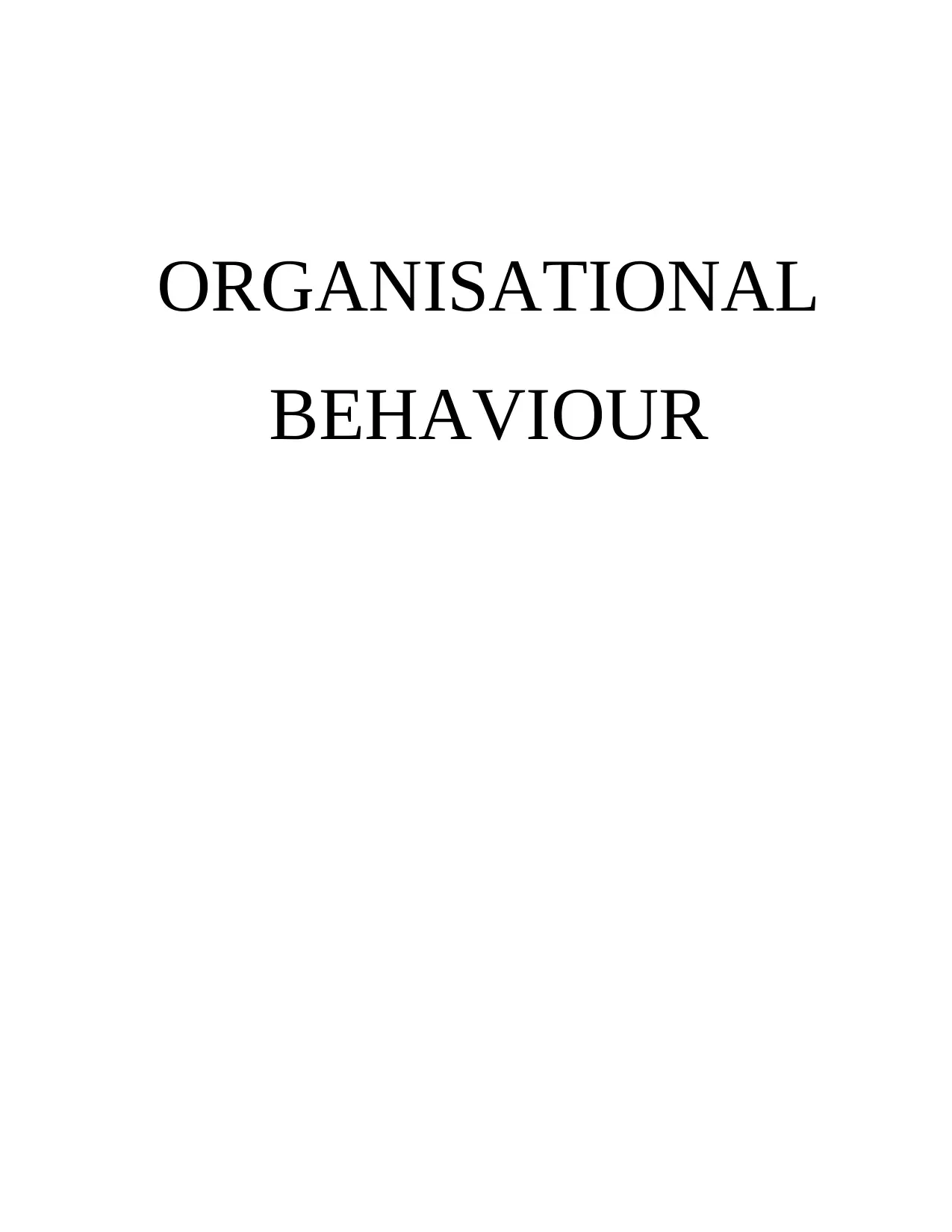
ORGANISATIONAL
BEHAVIOUR
BEHAVIOUR
Paraphrase This Document
Need a fresh take? Get an instant paraphrase of this document with our AI Paraphraser
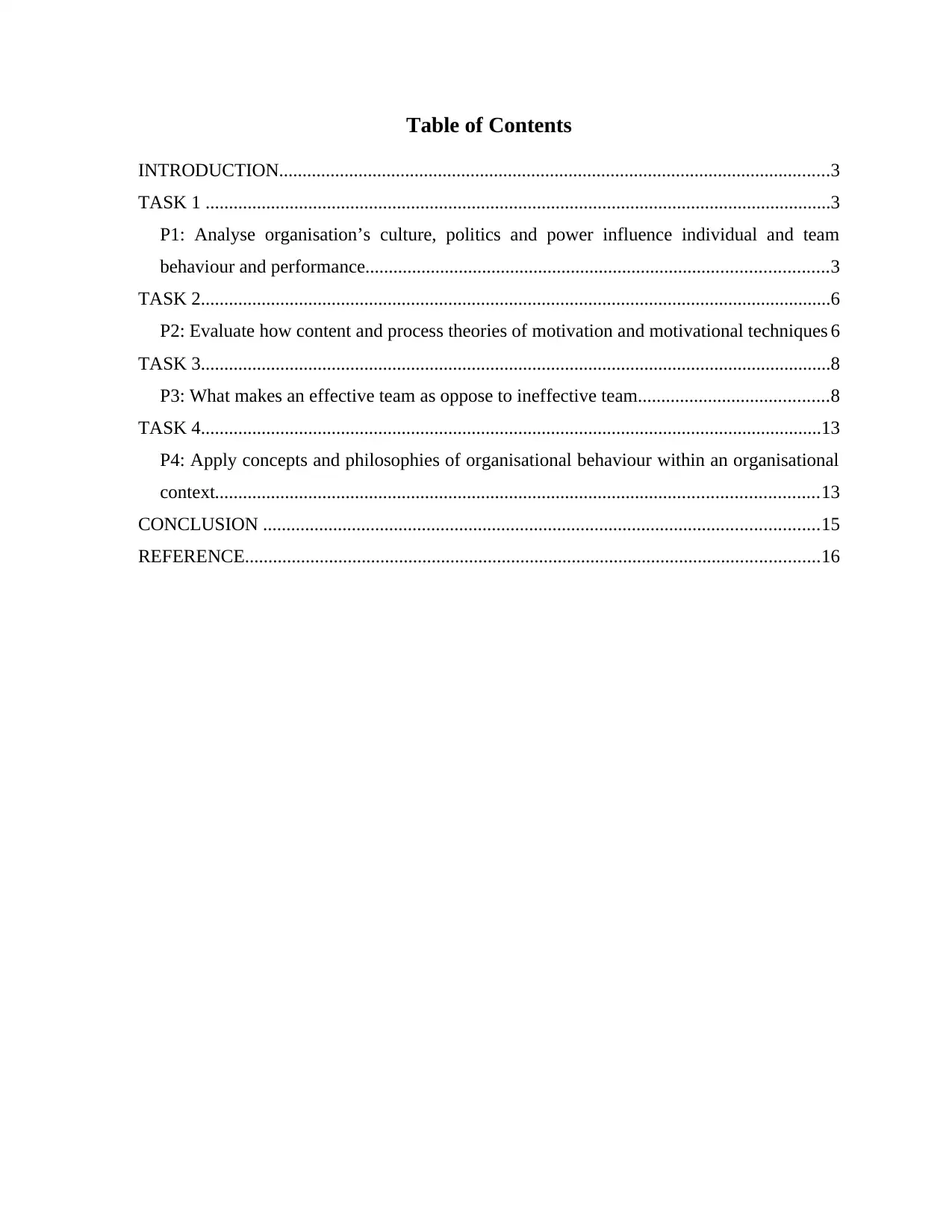
Table of Contents
INTRODUCTION......................................................................................................................3
TASK 1 ......................................................................................................................................3
P1: Analyse organisation’s culture, politics and power influence individual and team
behaviour and performance...................................................................................................3
TASK 2.......................................................................................................................................6
P2: Evaluate how content and process theories of motivation and motivational techniques 6
TASK 3.......................................................................................................................................8
P3: What makes an effective team as oppose to ineffective team.........................................8
TASK 4.....................................................................................................................................13
P4: Apply concepts and philosophies of organisational behaviour within an organisational
context.................................................................................................................................13
CONCLUSION .......................................................................................................................15
REFERENCE...........................................................................................................................16
INTRODUCTION......................................................................................................................3
TASK 1 ......................................................................................................................................3
P1: Analyse organisation’s culture, politics and power influence individual and team
behaviour and performance...................................................................................................3
TASK 2.......................................................................................................................................6
P2: Evaluate how content and process theories of motivation and motivational techniques 6
TASK 3.......................................................................................................................................8
P3: What makes an effective team as oppose to ineffective team.........................................8
TASK 4.....................................................................................................................................13
P4: Apply concepts and philosophies of organisational behaviour within an organisational
context.................................................................................................................................13
CONCLUSION .......................................................................................................................15
REFERENCE...........................................................................................................................16
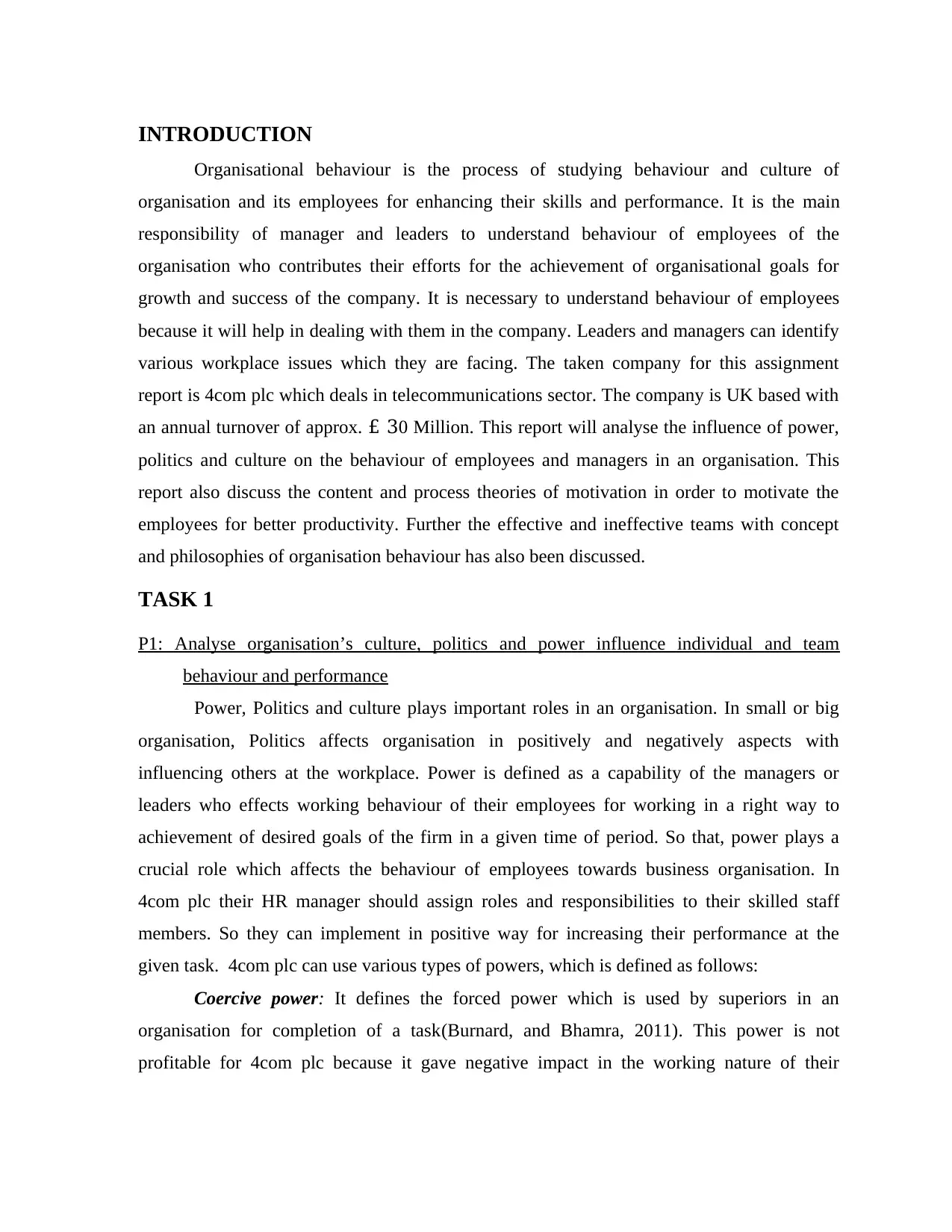
INTRODUCTION
Organisational behaviour is the process of studying behaviour and culture of
organisation and its employees for enhancing their skills and performance. It is the main
responsibility of manager and leaders to understand behaviour of employees of the
organisation who contributes their efforts for the achievement of organisational goals for
growth and success of the company. It is necessary to understand behaviour of employees
because it will help in dealing with them in the company. Leaders and managers can identify
various workplace issues which they are facing. The taken company for this assignment
report is 4com plc which deals in telecommunications sector. The company is UK based with
an annual turnover of approx. £ 30 Million. This report will analyse the influence of power,
politics and culture on the behaviour of employees and managers in an organisation. This
report also discuss the content and process theories of motivation in order to motivate the
employees for better productivity. Further the effective and ineffective teams with concept
and philosophies of organisation behaviour has also been discussed.
TASK 1
P1: Analyse organisation’s culture, politics and power influence individual and team
behaviour and performance
Power, Politics and culture plays important roles in an organisation. In small or big
organisation, Politics affects organisation in positively and negatively aspects with
influencing others at the workplace. Power is defined as a capability of the managers or
leaders who effects working behaviour of their employees for working in a right way to
achievement of desired goals of the firm in a given time of period. So that, power plays a
crucial role which affects the behaviour of employees towards business organisation. In
4com plc their HR manager should assign roles and responsibilities to their skilled staff
members. So they can implement in positive way for increasing their performance at the
given task. 4com plc can use various types of powers, which is defined as follows:
Coercive power: It defines the forced power which is used by superiors in an
organisation for completion of a task(Burnard, and Bhamra, 2011). This power is not
profitable for 4com plc because it gave negative impact in the working nature of their
Organisational behaviour is the process of studying behaviour and culture of
organisation and its employees for enhancing their skills and performance. It is the main
responsibility of manager and leaders to understand behaviour of employees of the
organisation who contributes their efforts for the achievement of organisational goals for
growth and success of the company. It is necessary to understand behaviour of employees
because it will help in dealing with them in the company. Leaders and managers can identify
various workplace issues which they are facing. The taken company for this assignment
report is 4com plc which deals in telecommunications sector. The company is UK based with
an annual turnover of approx. £ 30 Million. This report will analyse the influence of power,
politics and culture on the behaviour of employees and managers in an organisation. This
report also discuss the content and process theories of motivation in order to motivate the
employees for better productivity. Further the effective and ineffective teams with concept
and philosophies of organisation behaviour has also been discussed.
TASK 1
P1: Analyse organisation’s culture, politics and power influence individual and team
behaviour and performance
Power, Politics and culture plays important roles in an organisation. In small or big
organisation, Politics affects organisation in positively and negatively aspects with
influencing others at the workplace. Power is defined as a capability of the managers or
leaders who effects working behaviour of their employees for working in a right way to
achievement of desired goals of the firm in a given time of period. So that, power plays a
crucial role which affects the behaviour of employees towards business organisation. In
4com plc their HR manager should assign roles and responsibilities to their skilled staff
members. So they can implement in positive way for increasing their performance at the
given task. 4com plc can use various types of powers, which is defined as follows:
Coercive power: It defines the forced power which is used by superiors in an
organisation for completion of a task(Burnard, and Bhamra, 2011). This power is not
profitable for 4com plc because it gave negative impact in the working nature of their
⊘ This is a preview!⊘
Do you want full access?
Subscribe today to unlock all pages.

Trusted by 1+ million students worldwide
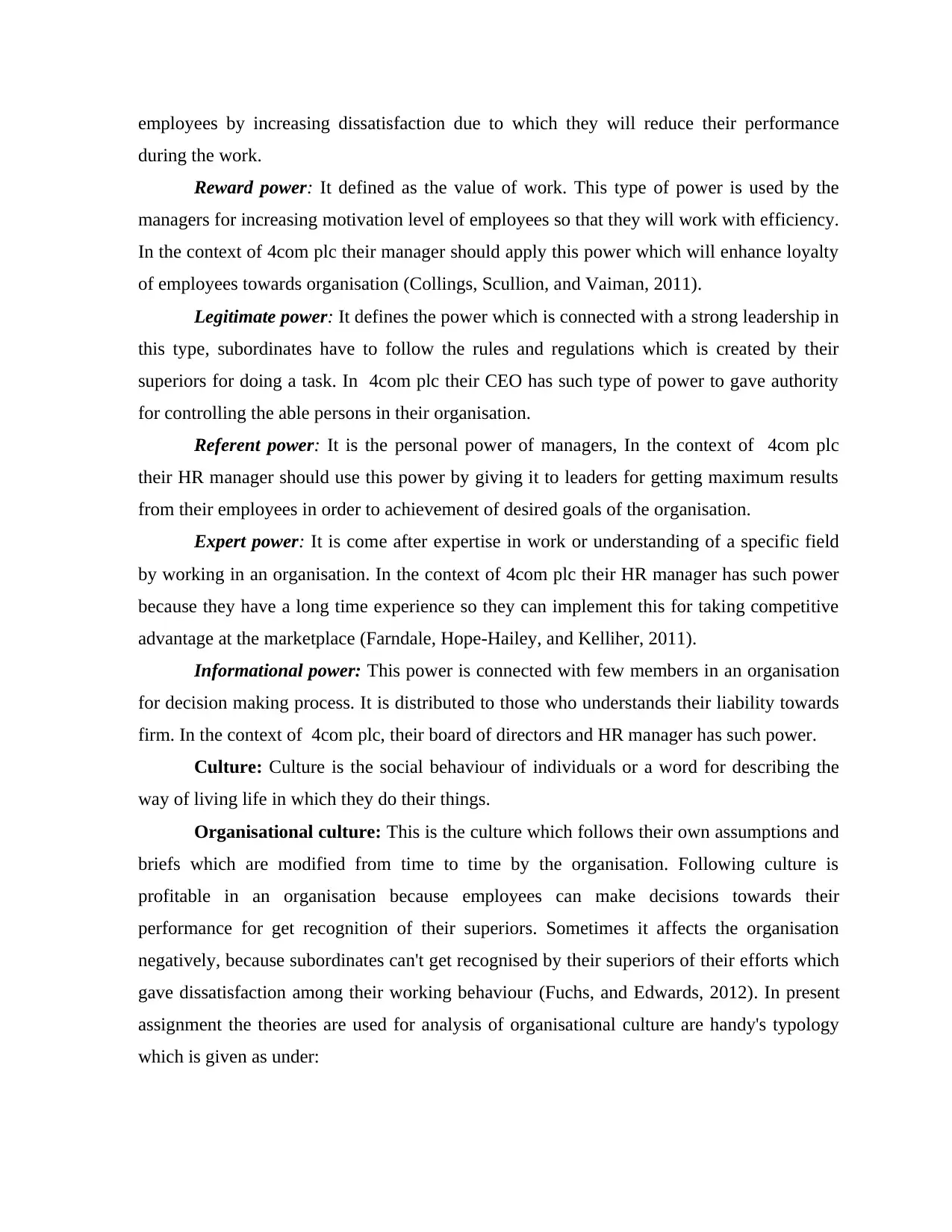
employees by increasing dissatisfaction due to which they will reduce their performance
during the work.
Reward power: It defined as the value of work. This type of power is used by the
managers for increasing motivation level of employees so that they will work with efficiency.
In the context of 4com plc their manager should apply this power which will enhance loyalty
of employees towards organisation (Collings, Scullion, and Vaiman, 2011).
Legitimate power: It defines the power which is connected with a strong leadership in
this type, subordinates have to follow the rules and regulations which is created by their
superiors for doing a task. In 4com plc their CEO has such type of power to gave authority
for controlling the able persons in their organisation.
Referent power: It is the personal power of managers, In the context of 4com plc
their HR manager should use this power by giving it to leaders for getting maximum results
from their employees in order to achievement of desired goals of the organisation.
Expert power: It is come after expertise in work or understanding of a specific field
by working in an organisation. In the context of 4com plc their HR manager has such power
because they have a long time experience so they can implement this for taking competitive
advantage at the marketplace (Farndale, Hope-Hailey, and Kelliher, 2011).
Informational power: This power is connected with few members in an organisation
for decision making process. It is distributed to those who understands their liability towards
firm. In the context of 4com plc, their board of directors and HR manager has such power.
Culture: Culture is the social behaviour of individuals or a word for describing the
way of living life in which they do their things.
Organisational culture: This is the culture which follows their own assumptions and
briefs which are modified from time to time by the organisation. Following culture is
profitable in an organisation because employees can make decisions towards their
performance for get recognition of their superiors. Sometimes it affects the organisation
negatively, because subordinates can't get recognised by their superiors of their efforts which
gave dissatisfaction among their working behaviour (Fuchs, and Edwards, 2012). In present
assignment the theories are used for analysis of organisational culture are handy's typology
which is given as under:
during the work.
Reward power: It defined as the value of work. This type of power is used by the
managers for increasing motivation level of employees so that they will work with efficiency.
In the context of 4com plc their manager should apply this power which will enhance loyalty
of employees towards organisation (Collings, Scullion, and Vaiman, 2011).
Legitimate power: It defines the power which is connected with a strong leadership in
this type, subordinates have to follow the rules and regulations which is created by their
superiors for doing a task. In 4com plc their CEO has such type of power to gave authority
for controlling the able persons in their organisation.
Referent power: It is the personal power of managers, In the context of 4com plc
their HR manager should use this power by giving it to leaders for getting maximum results
from their employees in order to achievement of desired goals of the organisation.
Expert power: It is come after expertise in work or understanding of a specific field
by working in an organisation. In the context of 4com plc their HR manager has such power
because they have a long time experience so they can implement this for taking competitive
advantage at the marketplace (Farndale, Hope-Hailey, and Kelliher, 2011).
Informational power: This power is connected with few members in an organisation
for decision making process. It is distributed to those who understands their liability towards
firm. In the context of 4com plc, their board of directors and HR manager has such power.
Culture: Culture is the social behaviour of individuals or a word for describing the
way of living life in which they do their things.
Organisational culture: This is the culture which follows their own assumptions and
briefs which are modified from time to time by the organisation. Following culture is
profitable in an organisation because employees can make decisions towards their
performance for get recognition of their superiors. Sometimes it affects the organisation
negatively, because subordinates can't get recognised by their superiors of their efforts which
gave dissatisfaction among their working behaviour (Fuchs, and Edwards, 2012). In present
assignment the theories are used for analysis of organisational culture are handy's typology
which is given as under:
Paraphrase This Document
Need a fresh take? Get an instant paraphrase of this document with our AI Paraphraser
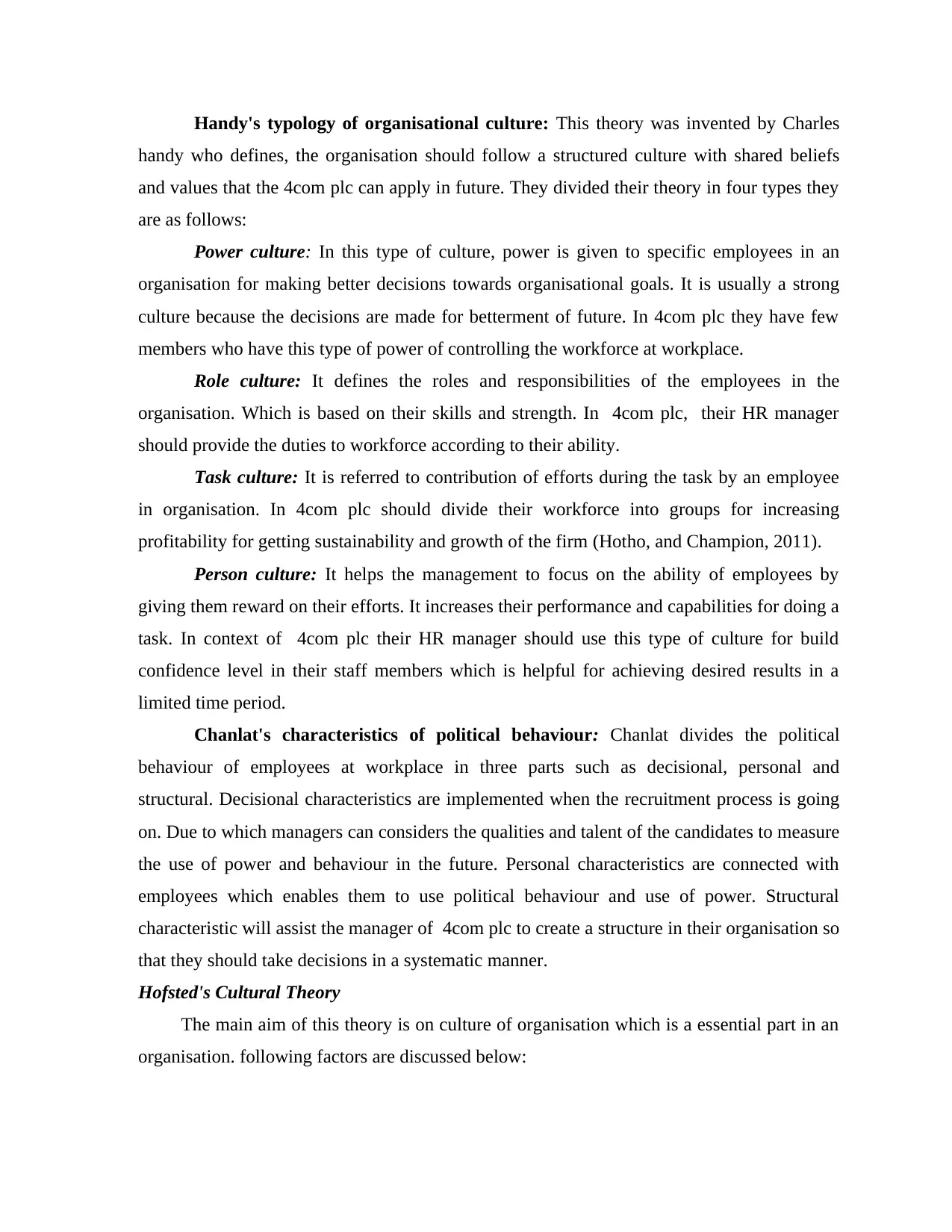
Handy's typology of organisational culture: This theory was invented by Charles
handy who defines, the organisation should follow a structured culture with shared beliefs
and values that the 4com plc can apply in future. They divided their theory in four types they
are as follows:
Power culture: In this type of culture, power is given to specific employees in an
organisation for making better decisions towards organisational goals. It is usually a strong
culture because the decisions are made for betterment of future. In 4com plc they have few
members who have this type of power of controlling the workforce at workplace.
Role culture: It defines the roles and responsibilities of the employees in the
organisation. Which is based on their skills and strength. In 4com plc, their HR manager
should provide the duties to workforce according to their ability.
Task culture: It is referred to contribution of efforts during the task by an employee
in organisation. In 4com plc should divide their workforce into groups for increasing
profitability for getting sustainability and growth of the firm (Hotho, and Champion, 2011).
Person culture: It helps the management to focus on the ability of employees by
giving them reward on their efforts. It increases their performance and capabilities for doing a
task. In context of 4com plc their HR manager should use this type of culture for build
confidence level in their staff members which is helpful for achieving desired results in a
limited time period.
Chanlat's characteristics of political behaviour: Chanlat divides the political
behaviour of employees at workplace in three parts such as decisional, personal and
structural. Decisional characteristics are implemented when the recruitment process is going
on. Due to which managers can considers the qualities and talent of the candidates to measure
the use of power and behaviour in the future. Personal characteristics are connected with
employees which enables them to use political behaviour and use of power. Structural
characteristic will assist the manager of 4com plc to create a structure in their organisation so
that they should take decisions in a systematic manner.
Hofsted's Cultural Theory
The main aim of this theory is on culture of organisation which is a essential part in an
organisation. following factors are discussed below:
handy who defines, the organisation should follow a structured culture with shared beliefs
and values that the 4com plc can apply in future. They divided their theory in four types they
are as follows:
Power culture: In this type of culture, power is given to specific employees in an
organisation for making better decisions towards organisational goals. It is usually a strong
culture because the decisions are made for betterment of future. In 4com plc they have few
members who have this type of power of controlling the workforce at workplace.
Role culture: It defines the roles and responsibilities of the employees in the
organisation. Which is based on their skills and strength. In 4com plc, their HR manager
should provide the duties to workforce according to their ability.
Task culture: It is referred to contribution of efforts during the task by an employee
in organisation. In 4com plc should divide their workforce into groups for increasing
profitability for getting sustainability and growth of the firm (Hotho, and Champion, 2011).
Person culture: It helps the management to focus on the ability of employees by
giving them reward on their efforts. It increases their performance and capabilities for doing a
task. In context of 4com plc their HR manager should use this type of culture for build
confidence level in their staff members which is helpful for achieving desired results in a
limited time period.
Chanlat's characteristics of political behaviour: Chanlat divides the political
behaviour of employees at workplace in three parts such as decisional, personal and
structural. Decisional characteristics are implemented when the recruitment process is going
on. Due to which managers can considers the qualities and talent of the candidates to measure
the use of power and behaviour in the future. Personal characteristics are connected with
employees which enables them to use political behaviour and use of power. Structural
characteristic will assist the manager of 4com plc to create a structure in their organisation so
that they should take decisions in a systematic manner.
Hofsted's Cultural Theory
The main aim of this theory is on culture of organisation which is a essential part in an
organisation. following factors are discussed below:
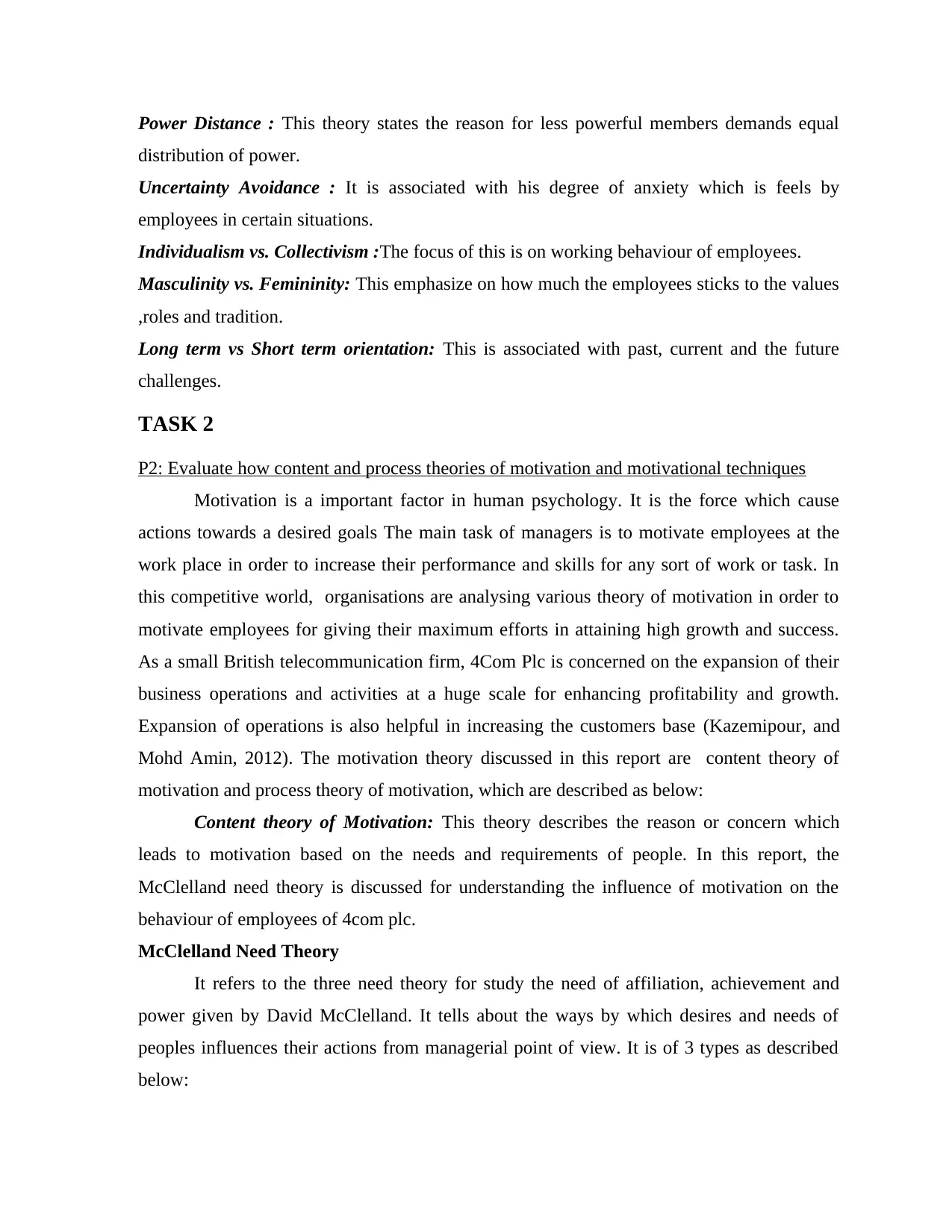
Power Distance : This theory states the reason for less powerful members demands equal
distribution of power.
Uncertainty Avoidance : It is associated with his degree of anxiety which is feels by
employees in certain situations.
Individualism vs. Collectivism :The focus of this is on working behaviour of employees.
Masculinity vs. Femininity: This emphasize on how much the employees sticks to the values
,roles and tradition.
Long term vs Short term orientation: This is associated with past, current and the future
challenges.
TASK 2
P2: Evaluate how content and process theories of motivation and motivational techniques
Motivation is a important factor in human psychology. It is the force which cause
actions towards a desired goals The main task of managers is to motivate employees at the
work place in order to increase their performance and skills for any sort of work or task. In
this competitive world, organisations are analysing various theory of motivation in order to
motivate employees for giving their maximum efforts in attaining high growth and success.
As a small British telecommunication firm, 4Com Plc is concerned on the expansion of their
business operations and activities at a huge scale for enhancing profitability and growth.
Expansion of operations is also helpful in increasing the customers base (Kazemipour, and
Mohd Amin, 2012). The motivation theory discussed in this report are content theory of
motivation and process theory of motivation, which are described as below:
Content theory of Motivation: This theory describes the reason or concern which
leads to motivation based on the needs and requirements of people. In this report, the
McClelland need theory is discussed for understanding the influence of motivation on the
behaviour of employees of 4com plc.
McClelland Need Theory
It refers to the three need theory for study the need of affiliation, achievement and
power given by David McClelland. It tells about the ways by which desires and needs of
peoples influences their actions from managerial point of view. It is of 3 types as described
below:
distribution of power.
Uncertainty Avoidance : It is associated with his degree of anxiety which is feels by
employees in certain situations.
Individualism vs. Collectivism :The focus of this is on working behaviour of employees.
Masculinity vs. Femininity: This emphasize on how much the employees sticks to the values
,roles and tradition.
Long term vs Short term orientation: This is associated with past, current and the future
challenges.
TASK 2
P2: Evaluate how content and process theories of motivation and motivational techniques
Motivation is a important factor in human psychology. It is the force which cause
actions towards a desired goals The main task of managers is to motivate employees at the
work place in order to increase their performance and skills for any sort of work or task. In
this competitive world, organisations are analysing various theory of motivation in order to
motivate employees for giving their maximum efforts in attaining high growth and success.
As a small British telecommunication firm, 4Com Plc is concerned on the expansion of their
business operations and activities at a huge scale for enhancing profitability and growth.
Expansion of operations is also helpful in increasing the customers base (Kazemipour, and
Mohd Amin, 2012). The motivation theory discussed in this report are content theory of
motivation and process theory of motivation, which are described as below:
Content theory of Motivation: This theory describes the reason or concern which
leads to motivation based on the needs and requirements of people. In this report, the
McClelland need theory is discussed for understanding the influence of motivation on the
behaviour of employees of 4com plc.
McClelland Need Theory
It refers to the three need theory for study the need of affiliation, achievement and
power given by David McClelland. It tells about the ways by which desires and needs of
peoples influences their actions from managerial point of view. It is of 3 types as described
below:
⊘ This is a preview!⊘
Do you want full access?
Subscribe today to unlock all pages.

Trusted by 1+ million students worldwide
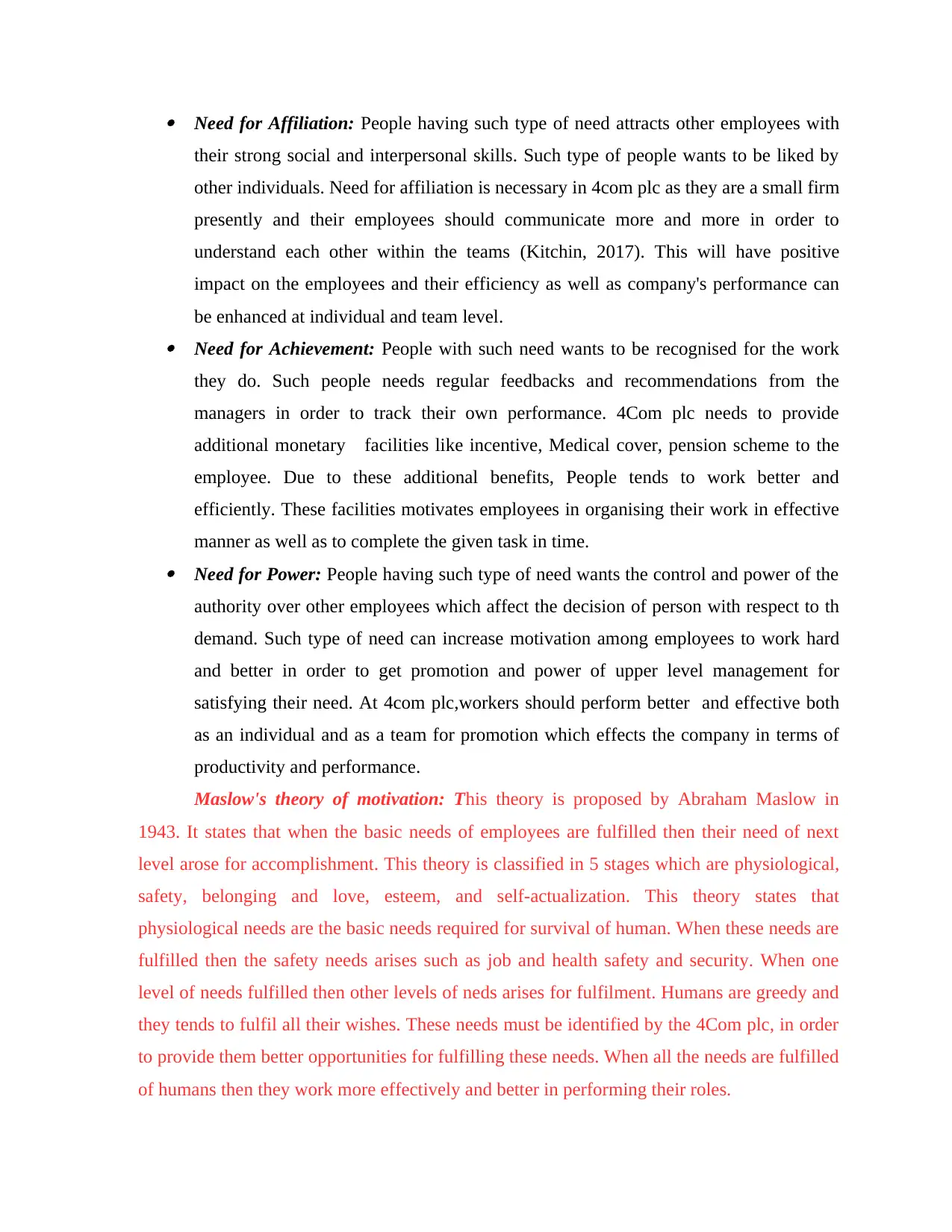
Need for Affiliation: People having such type of need attracts other employees with
their strong social and interpersonal skills. Such type of people wants to be liked by
other individuals. Need for affiliation is necessary in 4com plc as they are a small firm
presently and their employees should communicate more and more in order to
understand each other within the teams (Kitchin, 2017). This will have positive
impact on the employees and their efficiency as well as company's performance can
be enhanced at individual and team level.
Need for Achievement: People with such need wants to be recognised for the work
they do. Such people needs regular feedbacks and recommendations from the
managers in order to track their own performance. 4Com plc needs to provide
additional monetary facilities like incentive, Medical cover, pension scheme to the
employee. Due to these additional benefits, People tends to work better and
efficiently. These facilities motivates employees in organising their work in effective
manner as well as to complete the given task in time.
Need for Power: People having such type of need wants the control and power of the
authority over other employees which affect the decision of person with respect to th
demand. Such type of need can increase motivation among employees to work hard
and better in order to get promotion and power of upper level management for
satisfying their need. At 4com plc,workers should perform better and effective both
as an individual and as a team for promotion which effects the company in terms of
productivity and performance.
Maslow's theory of motivation: This theory is proposed by Abraham Maslow in
1943. It states that when the basic needs of employees are fulfilled then their need of next
level arose for accomplishment. This theory is classified in 5 stages which are physiological,
safety, belonging and love, esteem, and self-actualization. This theory states that
physiological needs are the basic needs required for survival of human. When these needs are
fulfilled then the safety needs arises such as job and health safety and security. When one
level of needs fulfilled then other levels of neds arises for fulfilment. Humans are greedy and
they tends to fulfil all their wishes. These needs must be identified by the 4Com plc, in order
to provide them better opportunities for fulfilling these needs. When all the needs are fulfilled
of humans then they work more effectively and better in performing their roles.
their strong social and interpersonal skills. Such type of people wants to be liked by
other individuals. Need for affiliation is necessary in 4com plc as they are a small firm
presently and their employees should communicate more and more in order to
understand each other within the teams (Kitchin, 2017). This will have positive
impact on the employees and their efficiency as well as company's performance can
be enhanced at individual and team level.
Need for Achievement: People with such need wants to be recognised for the work
they do. Such people needs regular feedbacks and recommendations from the
managers in order to track their own performance. 4Com plc needs to provide
additional monetary facilities like incentive, Medical cover, pension scheme to the
employee. Due to these additional benefits, People tends to work better and
efficiently. These facilities motivates employees in organising their work in effective
manner as well as to complete the given task in time.
Need for Power: People having such type of need wants the control and power of the
authority over other employees which affect the decision of person with respect to th
demand. Such type of need can increase motivation among employees to work hard
and better in order to get promotion and power of upper level management for
satisfying their need. At 4com plc,workers should perform better and effective both
as an individual and as a team for promotion which effects the company in terms of
productivity and performance.
Maslow's theory of motivation: This theory is proposed by Abraham Maslow in
1943. It states that when the basic needs of employees are fulfilled then their need of next
level arose for accomplishment. This theory is classified in 5 stages which are physiological,
safety, belonging and love, esteem, and self-actualization. This theory states that
physiological needs are the basic needs required for survival of human. When these needs are
fulfilled then the safety needs arises such as job and health safety and security. When one
level of needs fulfilled then other levels of neds arises for fulfilment. Humans are greedy and
they tends to fulfil all their wishes. These needs must be identified by the 4Com plc, in order
to provide them better opportunities for fulfilling these needs. When all the needs are fulfilled
of humans then they work more effectively and better in performing their roles.
Paraphrase This Document
Need a fresh take? Get an instant paraphrase of this document with our AI Paraphraser
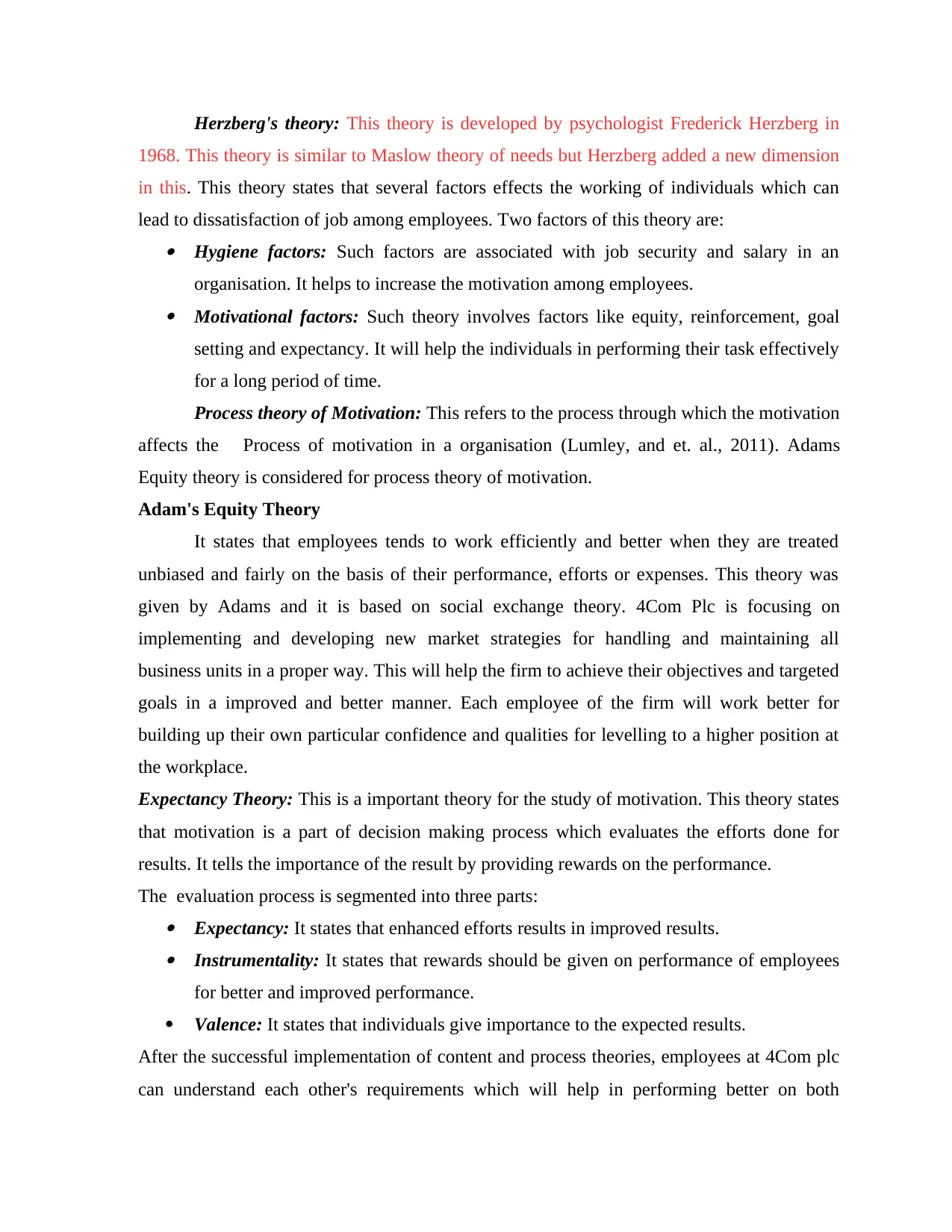
Herzberg's theory: This theory is developed by psychologist Frederick Herzberg in
1968. This theory is similar to Maslow theory of needs but Herzberg added a new dimension
in this. This theory states that several factors effects the working of individuals which can
lead to dissatisfaction of job among employees. Two factors of this theory are:
Hygiene factors: Such factors are associated with job security and salary in an
organisation. It helps to increase the motivation among employees.
Motivational factors: Such theory involves factors like equity, reinforcement, goal
setting and expectancy. It will help the individuals in performing their task effectively
for a long period of time.
Process theory of Motivation: This refers to the process through which the motivation
affects the Process of motivation in a organisation (Lumley, and et. al., 2011). Adams
Equity theory is considered for process theory of motivation.
Adam's Equity Theory
It states that employees tends to work efficiently and better when they are treated
unbiased and fairly on the basis of their performance, efforts or expenses. This theory was
given by Adams and it is based on social exchange theory. 4Com Plc is focusing on
implementing and developing new market strategies for handling and maintaining all
business units in a proper way. This will help the firm to achieve their objectives and targeted
goals in a improved and better manner. Each employee of the firm will work better for
building up their own particular confidence and qualities for levelling to a higher position at
the workplace.
Expectancy Theory: This is a important theory for the study of motivation. This theory states
that motivation is a part of decision making process which evaluates the efforts done for
results. It tells the importance of the result by providing rewards on the performance.
The evaluation process is segmented into three parts:
Expectancy: It states that enhanced efforts results in improved results.
Instrumentality: It states that rewards should be given on performance of employees
for better and improved performance.
Valence: It states that individuals give importance to the expected results.
After the successful implementation of content and process theories, employees at 4Com plc
can understand each other's requirements which will help in performing better on both
1968. This theory is similar to Maslow theory of needs but Herzberg added a new dimension
in this. This theory states that several factors effects the working of individuals which can
lead to dissatisfaction of job among employees. Two factors of this theory are:
Hygiene factors: Such factors are associated with job security and salary in an
organisation. It helps to increase the motivation among employees.
Motivational factors: Such theory involves factors like equity, reinforcement, goal
setting and expectancy. It will help the individuals in performing their task effectively
for a long period of time.
Process theory of Motivation: This refers to the process through which the motivation
affects the Process of motivation in a organisation (Lumley, and et. al., 2011). Adams
Equity theory is considered for process theory of motivation.
Adam's Equity Theory
It states that employees tends to work efficiently and better when they are treated
unbiased and fairly on the basis of their performance, efforts or expenses. This theory was
given by Adams and it is based on social exchange theory. 4Com Plc is focusing on
implementing and developing new market strategies for handling and maintaining all
business units in a proper way. This will help the firm to achieve their objectives and targeted
goals in a improved and better manner. Each employee of the firm will work better for
building up their own particular confidence and qualities for levelling to a higher position at
the workplace.
Expectancy Theory: This is a important theory for the study of motivation. This theory states
that motivation is a part of decision making process which evaluates the efforts done for
results. It tells the importance of the result by providing rewards on the performance.
The evaluation process is segmented into three parts:
Expectancy: It states that enhanced efforts results in improved results.
Instrumentality: It states that rewards should be given on performance of employees
for better and improved performance.
Valence: It states that individuals give importance to the expected results.
After the successful implementation of content and process theories, employees at 4Com plc
can understand each other's requirements which will help in performing better on both
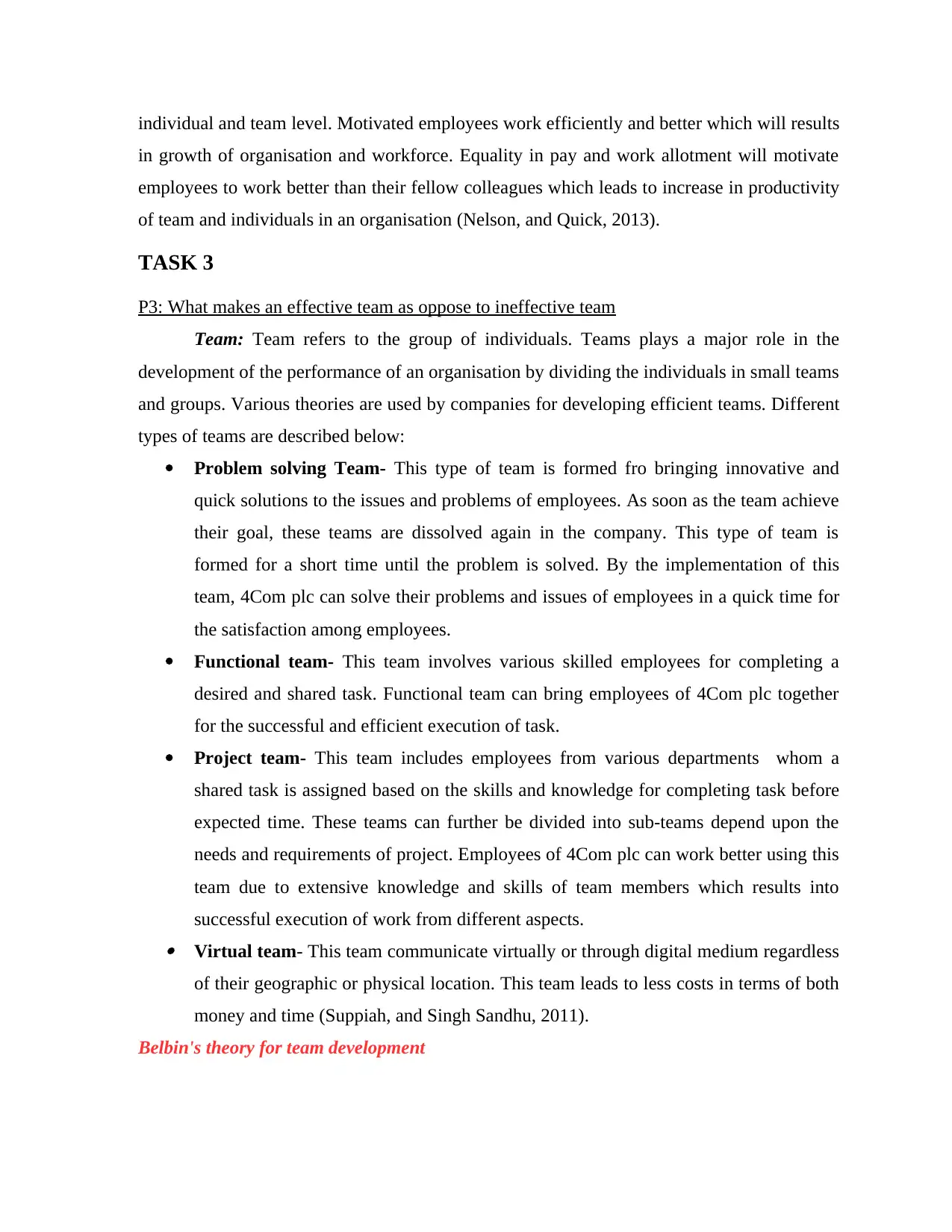
individual and team level. Motivated employees work efficiently and better which will results
in growth of organisation and workforce. Equality in pay and work allotment will motivate
employees to work better than their fellow colleagues which leads to increase in productivity
of team and individuals in an organisation (Nelson, and Quick, 2013).
TASK 3
P3: What makes an effective team as oppose to ineffective team
Team: Team refers to the group of individuals. Teams plays a major role in the
development of the performance of an organisation by dividing the individuals in small teams
and groups. Various theories are used by companies for developing efficient teams. Different
types of teams are described below:
Problem solving Team- This type of team is formed fro bringing innovative and
quick solutions to the issues and problems of employees. As soon as the team achieve
their goal, these teams are dissolved again in the company. This type of team is
formed for a short time until the problem is solved. By the implementation of this
team, 4Com plc can solve their problems and issues of employees in a quick time for
the satisfaction among employees.
Functional team- This team involves various skilled employees for completing a
desired and shared task. Functional team can bring employees of 4Com plc together
for the successful and efficient execution of task.
Project team- This team includes employees from various departments whom a
shared task is assigned based on the skills and knowledge for completing task before
expected time. These teams can further be divided into sub-teams depend upon the
needs and requirements of project. Employees of 4Com plc can work better using this
team due to extensive knowledge and skills of team members which results into
successful execution of work from different aspects.
Virtual team- This team communicate virtually or through digital medium regardless
of their geographic or physical location. This team leads to less costs in terms of both
money and time (Suppiah, and Singh Sandhu, 2011).
Belbin's theory for team development
in growth of organisation and workforce. Equality in pay and work allotment will motivate
employees to work better than their fellow colleagues which leads to increase in productivity
of team and individuals in an organisation (Nelson, and Quick, 2013).
TASK 3
P3: What makes an effective team as oppose to ineffective team
Team: Team refers to the group of individuals. Teams plays a major role in the
development of the performance of an organisation by dividing the individuals in small teams
and groups. Various theories are used by companies for developing efficient teams. Different
types of teams are described below:
Problem solving Team- This type of team is formed fro bringing innovative and
quick solutions to the issues and problems of employees. As soon as the team achieve
their goal, these teams are dissolved again in the company. This type of team is
formed for a short time until the problem is solved. By the implementation of this
team, 4Com plc can solve their problems and issues of employees in a quick time for
the satisfaction among employees.
Functional team- This team involves various skilled employees for completing a
desired and shared task. Functional team can bring employees of 4Com plc together
for the successful and efficient execution of task.
Project team- This team includes employees from various departments whom a
shared task is assigned based on the skills and knowledge for completing task before
expected time. These teams can further be divided into sub-teams depend upon the
needs and requirements of project. Employees of 4Com plc can work better using this
team due to extensive knowledge and skills of team members which results into
successful execution of work from different aspects.
Virtual team- This team communicate virtually or through digital medium regardless
of their geographic or physical location. This team leads to less costs in terms of both
money and time (Suppiah, and Singh Sandhu, 2011).
Belbin's theory for team development
⊘ This is a preview!⊘
Do you want full access?
Subscribe today to unlock all pages.

Trusted by 1+ million students worldwide
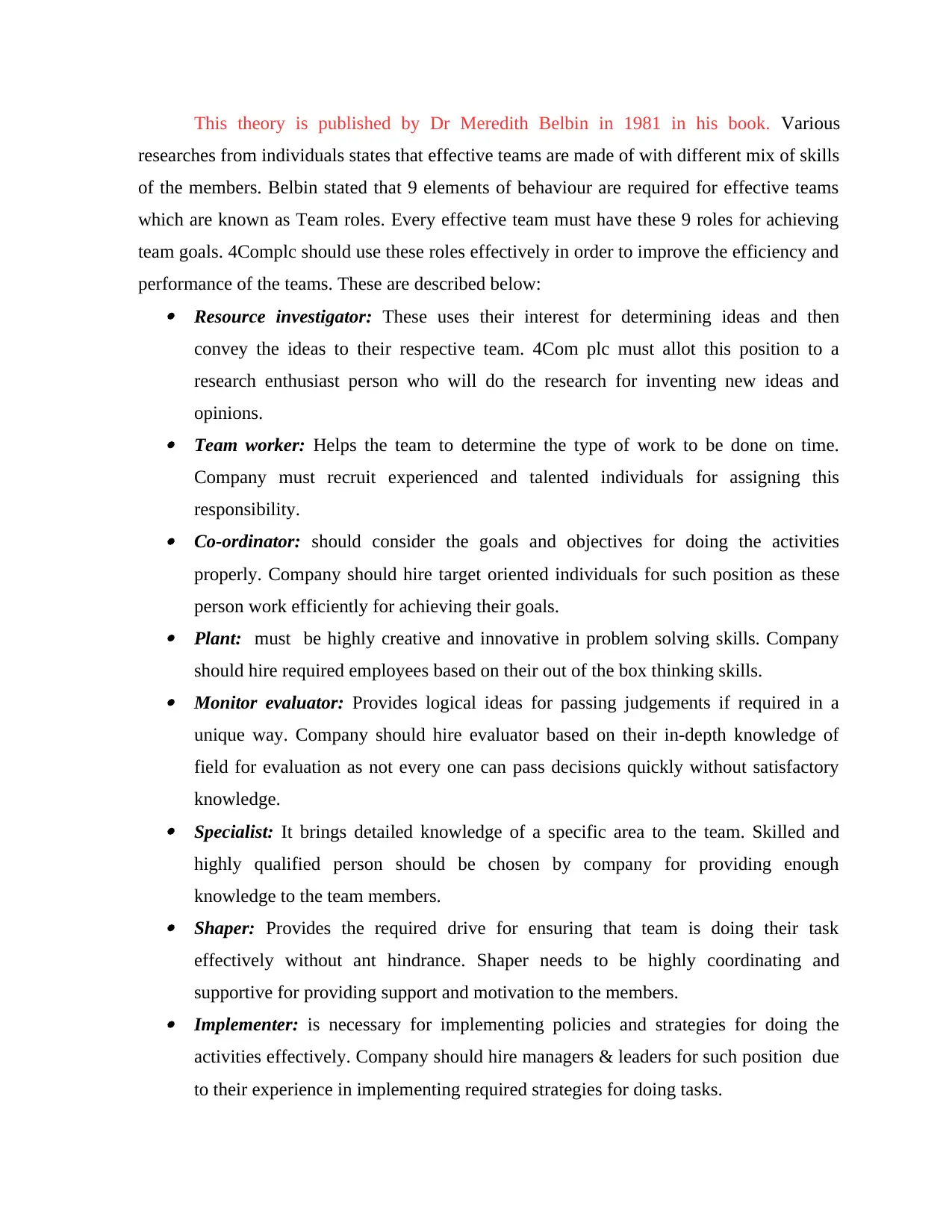
This theory is published by Dr Meredith Belbin in 1981 in his book. Various
researches from individuals states that effective teams are made of with different mix of skills
of the members. Belbin stated that 9 elements of behaviour are required for effective teams
which are known as Team roles. Every effective team must have these 9 roles for achieving
team goals. 4Complc should use these roles effectively in order to improve the efficiency and
performance of the teams. These are described below:
Resource investigator: These uses their interest for determining ideas and then
convey the ideas to their respective team. 4Com plc must allot this position to a
research enthusiast person who will do the research for inventing new ideas and
opinions.
Team worker: Helps the team to determine the type of work to be done on time.
Company must recruit experienced and talented individuals for assigning this
responsibility.
Co-ordinator: should consider the goals and objectives for doing the activities
properly. Company should hire target oriented individuals for such position as these
person work efficiently for achieving their goals.
Plant: must be highly creative and innovative in problem solving skills. Company
should hire required employees based on their out of the box thinking skills.
Monitor evaluator: Provides logical ideas for passing judgements if required in a
unique way. Company should hire evaluator based on their in-depth knowledge of
field for evaluation as not every one can pass decisions quickly without satisfactory
knowledge.
Specialist: It brings detailed knowledge of a specific area to the team. Skilled and
highly qualified person should be chosen by company for providing enough
knowledge to the team members.
Shaper: Provides the required drive for ensuring that team is doing their task
effectively without ant hindrance. Shaper needs to be highly coordinating and
supportive for providing support and motivation to the members.
Implementer: is necessary for implementing policies and strategies for doing the
activities effectively. Company should hire managers & leaders for such position due
to their experience in implementing required strategies for doing tasks.
researches from individuals states that effective teams are made of with different mix of skills
of the members. Belbin stated that 9 elements of behaviour are required for effective teams
which are known as Team roles. Every effective team must have these 9 roles for achieving
team goals. 4Complc should use these roles effectively in order to improve the efficiency and
performance of the teams. These are described below:
Resource investigator: These uses their interest for determining ideas and then
convey the ideas to their respective team. 4Com plc must allot this position to a
research enthusiast person who will do the research for inventing new ideas and
opinions.
Team worker: Helps the team to determine the type of work to be done on time.
Company must recruit experienced and talented individuals for assigning this
responsibility.
Co-ordinator: should consider the goals and objectives for doing the activities
properly. Company should hire target oriented individuals for such position as these
person work efficiently for achieving their goals.
Plant: must be highly creative and innovative in problem solving skills. Company
should hire required employees based on their out of the box thinking skills.
Monitor evaluator: Provides logical ideas for passing judgements if required in a
unique way. Company should hire evaluator based on their in-depth knowledge of
field for evaluation as not every one can pass decisions quickly without satisfactory
knowledge.
Specialist: It brings detailed knowledge of a specific area to the team. Skilled and
highly qualified person should be chosen by company for providing enough
knowledge to the team members.
Shaper: Provides the required drive for ensuring that team is doing their task
effectively without ant hindrance. Shaper needs to be highly coordinating and
supportive for providing support and motivation to the members.
Implementer: is necessary for implementing policies and strategies for doing the
activities effectively. Company should hire managers & leaders for such position due
to their experience in implementing required strategies for doing tasks.
Paraphrase This Document
Need a fresh take? Get an instant paraphrase of this document with our AI Paraphraser
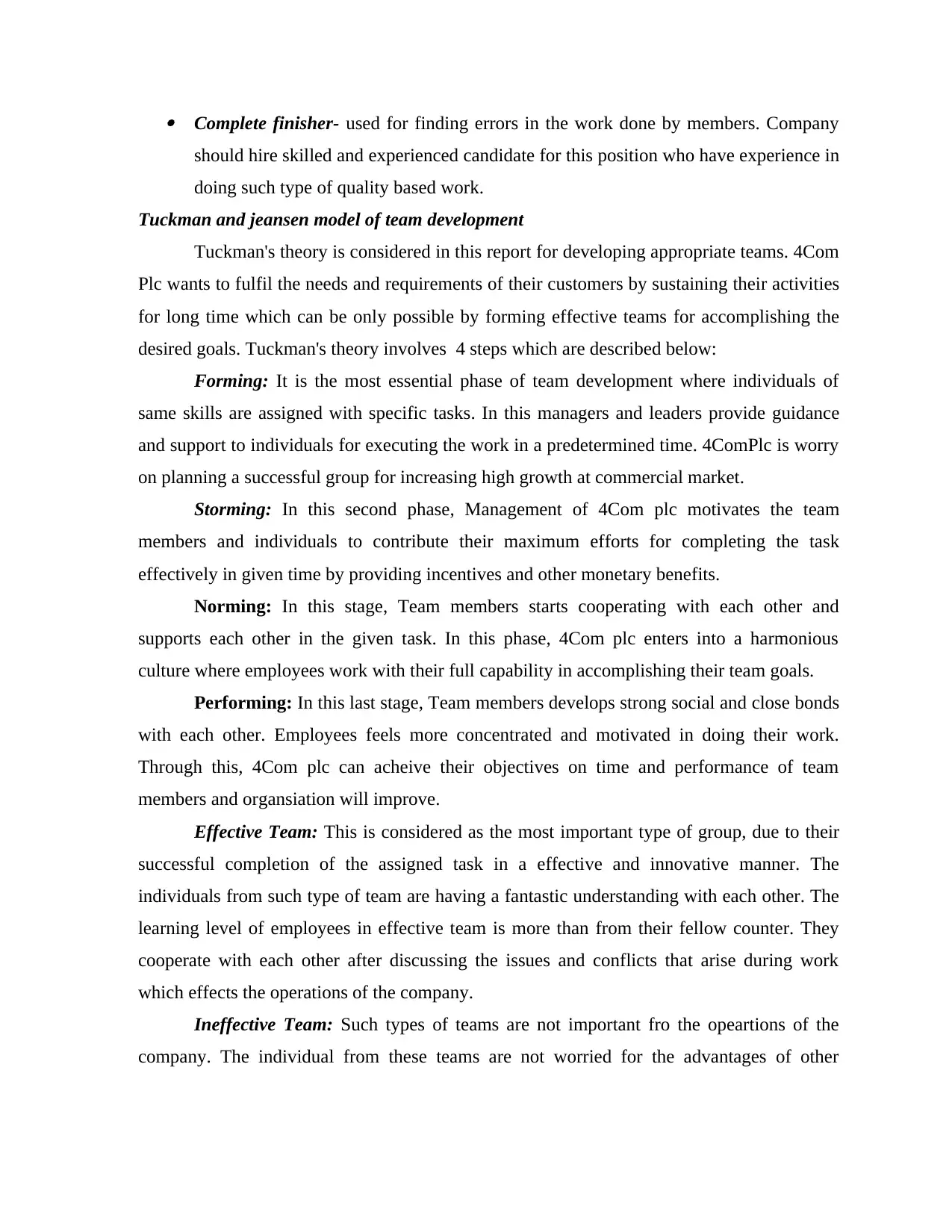
Complete finisher- used for finding errors in the work done by members. Company
should hire skilled and experienced candidate for this position who have experience in
doing such type of quality based work.
Tuckman and jeansen model of team development
Tuckman's theory is considered in this report for developing appropriate teams. 4Com
Plc wants to fulfil the needs and requirements of their customers by sustaining their activities
for long time which can be only possible by forming effective teams for accomplishing the
desired goals. Tuckman's theory involves 4 steps which are described below:
Forming: It is the most essential phase of team development where individuals of
same skills are assigned with specific tasks. In this managers and leaders provide guidance
and support to individuals for executing the work in a predetermined time. 4ComPlc is worry
on planning a successful group for increasing high growth at commercial market.
Storming: In this second phase, Management of 4Com plc motivates the team
members and individuals to contribute their maximum efforts for completing the task
effectively in given time by providing incentives and other monetary benefits.
Norming: In this stage, Team members starts cooperating with each other and
supports each other in the given task. In this phase, 4Com plc enters into a harmonious
culture where employees work with their full capability in accomplishing their team goals.
Performing: In this last stage, Team members develops strong social and close bonds
with each other. Employees feels more concentrated and motivated in doing their work.
Through this, 4Com plc can acheive their objectives on time and performance of team
members and organsiation will improve.
Effective Team: This is considered as the most important type of group, due to their
successful completion of the assigned task in a effective and innovative manner. The
individuals from such type of team are having a fantastic understanding with each other. The
learning level of employees in effective team is more than from their fellow counter. They
cooperate with each other after discussing the issues and conflicts that arise during work
which effects the operations of the company.
Ineffective Team: Such types of teams are not important fro the opeartions of the
company. The individual from these teams are not worried for the advantages of other
should hire skilled and experienced candidate for this position who have experience in
doing such type of quality based work.
Tuckman and jeansen model of team development
Tuckman's theory is considered in this report for developing appropriate teams. 4Com
Plc wants to fulfil the needs and requirements of their customers by sustaining their activities
for long time which can be only possible by forming effective teams for accomplishing the
desired goals. Tuckman's theory involves 4 steps which are described below:
Forming: It is the most essential phase of team development where individuals of
same skills are assigned with specific tasks. In this managers and leaders provide guidance
and support to individuals for executing the work in a predetermined time. 4ComPlc is worry
on planning a successful group for increasing high growth at commercial market.
Storming: In this second phase, Management of 4Com plc motivates the team
members and individuals to contribute their maximum efforts for completing the task
effectively in given time by providing incentives and other monetary benefits.
Norming: In this stage, Team members starts cooperating with each other and
supports each other in the given task. In this phase, 4Com plc enters into a harmonious
culture where employees work with their full capability in accomplishing their team goals.
Performing: In this last stage, Team members develops strong social and close bonds
with each other. Employees feels more concentrated and motivated in doing their work.
Through this, 4Com plc can acheive their objectives on time and performance of team
members and organsiation will improve.
Effective Team: This is considered as the most important type of group, due to their
successful completion of the assigned task in a effective and innovative manner. The
individuals from such type of team are having a fantastic understanding with each other. The
learning level of employees in effective team is more than from their fellow counter. They
cooperate with each other after discussing the issues and conflicts that arise during work
which effects the operations of the company.
Ineffective Team: Such types of teams are not important fro the opeartions of the
company. The individual from these teams are not worried for the advantages of other
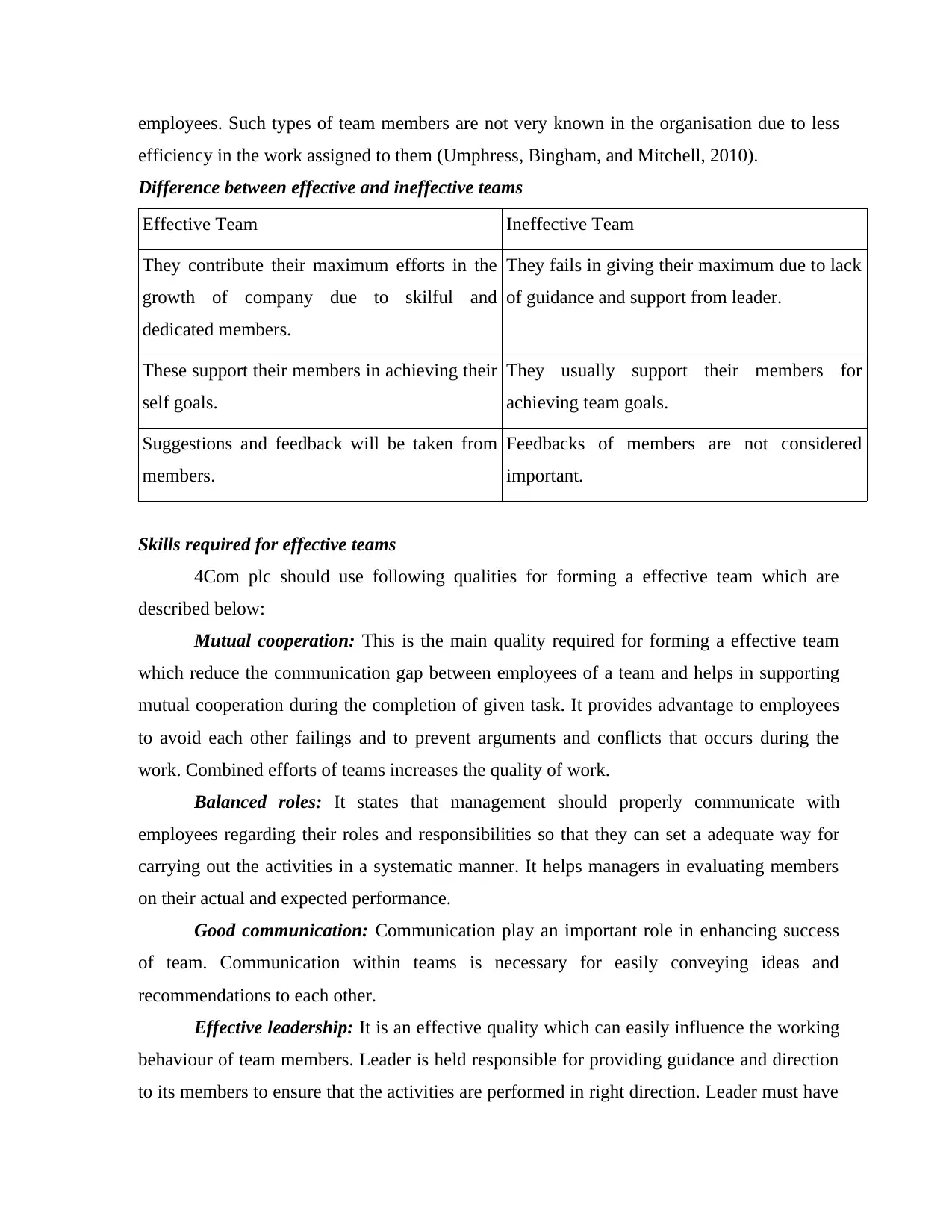
employees. Such types of team members are not very known in the organisation due to less
efficiency in the work assigned to them (Umphress, Bingham, and Mitchell, 2010).
Difference between effective and ineffective teams
Effective Team Ineffective Team
They contribute their maximum efforts in the
growth of company due to skilful and
dedicated members.
They fails in giving their maximum due to lack
of guidance and support from leader.
These support their members in achieving their
self goals.
They usually support their members for
achieving team goals.
Suggestions and feedback will be taken from
members.
Feedbacks of members are not considered
important.
Skills required for effective teams
4Com plc should use following qualities for forming a effective team which are
described below:
Mutual cooperation: This is the main quality required for forming a effective team
which reduce the communication gap between employees of a team and helps in supporting
mutual cooperation during the completion of given task. It provides advantage to employees
to avoid each other failings and to prevent arguments and conflicts that occurs during the
work. Combined efforts of teams increases the quality of work.
Balanced roles: It states that management should properly communicate with
employees regarding their roles and responsibilities so that they can set a adequate way for
carrying out the activities in a systematic manner. It helps managers in evaluating members
on their actual and expected performance.
Good communication: Communication play an important role in enhancing success
of team. Communication within teams is necessary for easily conveying ideas and
recommendations to each other.
Effective leadership: It is an effective quality which can easily influence the working
behaviour of team members. Leader is held responsible for providing guidance and direction
to its members to ensure that the activities are performed in right direction. Leader must have
efficiency in the work assigned to them (Umphress, Bingham, and Mitchell, 2010).
Difference between effective and ineffective teams
Effective Team Ineffective Team
They contribute their maximum efforts in the
growth of company due to skilful and
dedicated members.
They fails in giving their maximum due to lack
of guidance and support from leader.
These support their members in achieving their
self goals.
They usually support their members for
achieving team goals.
Suggestions and feedback will be taken from
members.
Feedbacks of members are not considered
important.
Skills required for effective teams
4Com plc should use following qualities for forming a effective team which are
described below:
Mutual cooperation: This is the main quality required for forming a effective team
which reduce the communication gap between employees of a team and helps in supporting
mutual cooperation during the completion of given task. It provides advantage to employees
to avoid each other failings and to prevent arguments and conflicts that occurs during the
work. Combined efforts of teams increases the quality of work.
Balanced roles: It states that management should properly communicate with
employees regarding their roles and responsibilities so that they can set a adequate way for
carrying out the activities in a systematic manner. It helps managers in evaluating members
on their actual and expected performance.
Good communication: Communication play an important role in enhancing success
of team. Communication within teams is necessary for easily conveying ideas and
recommendations to each other.
Effective leadership: It is an effective quality which can easily influence the working
behaviour of team members. Leader is held responsible for providing guidance and direction
to its members to ensure that the activities are performed in right direction. Leader must have
⊘ This is a preview!⊘
Do you want full access?
Subscribe today to unlock all pages.

Trusted by 1+ million students worldwide
1 out of 18
Related Documents
Your All-in-One AI-Powered Toolkit for Academic Success.
+13062052269
info@desklib.com
Available 24*7 on WhatsApp / Email
![[object Object]](/_next/static/media/star-bottom.7253800d.svg)
Unlock your academic potential
Copyright © 2020–2026 A2Z Services. All Rights Reserved. Developed and managed by ZUCOL.





